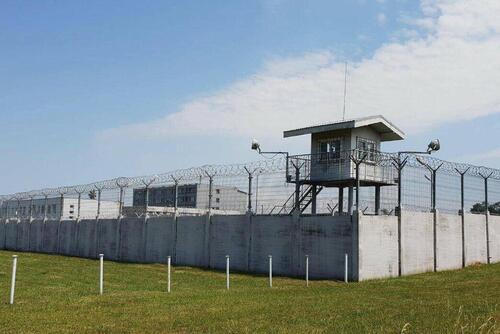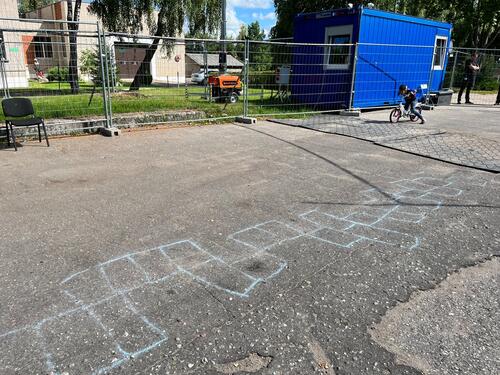- Lithuanian authorities have created a ‘hierarchy of suffering’ for asylum seekers in the country’s registration centres
- People of certain nationalities are being discriminated against, including having their detention extended, which is severely impacting their mental health
- MSF urges Lithuanian authorities to immediately end prolonged detention and to implement an equitable asylum system that respects the dignity of people seeking safety.
Vulnerable migrants and people seeking asylum who are held in prolonged detention in Lithuania are experiencing an alarming deterioration in their mental health. The Lithuanian authorities’ flawed migration practices and legal processes are further discriminating against certain nationalities, and contributing to the continued detention of these people, says Médecins Sans Frontières (MSF).
MSF condemns the prolonged detention and systemic discrimination in Lithuania. We call for the immediate implementation of humane alternatives that equitably meet the needs of vulnerable and traumatised people.
Instead of responding to their needs, the Lithuanian authorities are worsening their mental suffering by detaining them and holding them in limbo.Georgina Brown, MSF country manager in Lithuania.
“Many of the people detained have survived deeply traumatic experiences,” says Georgina Brown, MSF country manager in Lithuania. “But, instead of responding to their needs, the Lithuanian authorities are worsening their mental suffering by detaining them and holding them in limbo.”
“These men, women, and children are uncertain of their future, terrified of being forcibly returned to the danger they have fled, and imprisoned without freedom, autonomy, or adequate protection,” says Brown. “People’s resilience will diminish, and their suffering will only grow exponentially. Appallingly, we know that some nationalities are more likely to have this detention extended than others, creating a hierarchy of suffering that the Lithuanian authorities should be deeply ashamed of.”
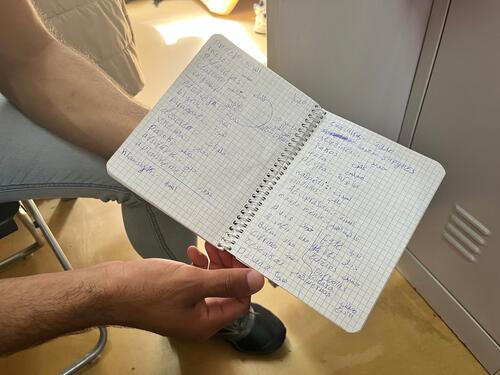
Approximately 700 people are detained in Kybartai, Pabrade and Rukla and Naujininkai Foreigner Registration Centres (FRCs) in Lithuania, after having crossed the border from Belarus in 2021. Many of these people have grave vulnerabilities and have experienced traumatising events, such as having been tortured or sexually assaulted. Detention is only exacerbating these people’s suffering, and some nationalities are experiencing higher rates of extensions to their detention.
Since January 2022, MSF has been providing basic healthcare (until May 2022)* and mental health support to the people held in Lithuania. However, we remain painfully aware that this work cannot address detention as the root cause of people’s suffering.
Of the patients who we provided mental healthcare for between January and March 2022, over 70 per cent highlighted detention as being the main cause of their need for support.
I am so desperate, I tried to hurt myself because I want to go out from this prison.A man detained in an FRC
“I am so desperate, I tried to hurt myself because I want to go out from this prison,” a man detained in an FRC in Lithuania told us. “Many times, I really decided to be ready to kill myself.”
“You are hurting, you are embarrassed, you are abused. And so, this is prison,” the man continued. “I was desperate. I was so depressed. But I can’t because we need more courage. I am not too broken.”
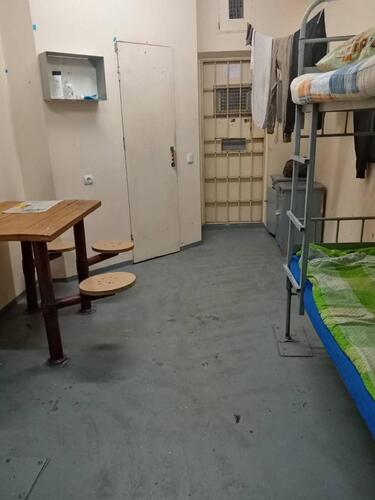
MSF has seen that some nationalities are significantly more likely to have this detention extended, remain detained after their detention order has expired, or have the limited freedom of movement they may have been granted revoked.
For example, Nigerians make up 16% of the 184 people being held in Kybartai FRC during August 2022, yet nearly 28% of the people enduring extensions to their detention. The largest nationality group makes up 18% of the total population, but under 2% of the extensions to detention.
Indians are only 6% of the people in this population but make up over 15% of the current extensions. Additionally, Russian and Belarusian asylum seekers who recently arrived in the FRC were not subject to detention at all, and 100% of them have been granted limited freedom of movement.
Us Africans are still here. Other nationalities were the majority. And now all of them have left, and us Africans remain.A man detained in an FRC
“Us Africans are still here,” says a man detained in a Lithuanian FRC who spoke to MSF. “Other nationalities were the majority. And now all of them have left, and us Africans remain.”
“There are so many things which were not equal treatment. They treat us differently. I don’t feel bad about this, because it’s not strange to me,” says the detained man. “You just need to accept how life is. You just need to keep breathing. If you kept breathing for 12 months, you can keep breathing.”
MSF sees this pattern echoed in other FRCs across Lithuania, including places where precise data is almost impossible to gather. We are receiving numerous reports from some of the FRCs that some nationalities, including Nigerians and Congolese, are more likely than others to be subject to discriminatory migration practices. These include continued detention after the expiration of their detention order without receiving a legislatively mandated court-issued extension, and having their limited freedom of movement revoked (returning them to detention).
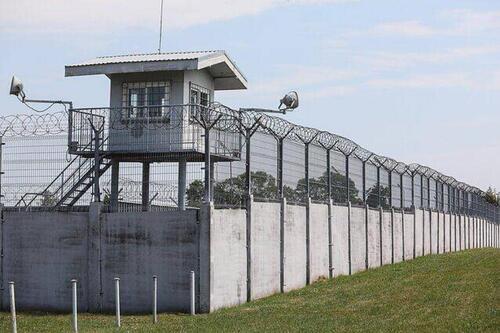
That the cruelty of detention is compounded in Lithuania by discriminatory practices and flawed legal processes, resulting in the further abuse of certain nationalities, underscores the inhumanity of the country’s approach to migration. It is the antithesis of the dignified and humane treatment, as well as the basic human rights, that these people are entitled to while in search of international protection.
In light of the suffering of the people who remain detained in Lithuania, and the Lithuanian authorities’ shameful contribution to the collective global degradation of the human rights of refugees, migrants, and asylum seekers, MSF is calling for prolonged detention to be immediately ended. We also urge the implementation of an equitable asylum system that respects the dignity, health and human rights of people seeking safety in Lithuania.
*Between January and early May 2022, MSF was operating in two of the three Foreigner Registration Centres (FRCs) in Kybartai and Medininkai, where we provided basic healthcare and psychological support to migrants and asylum seekers. On 6 May 2022, we suspended our activities in the two FRCs, as conditions imposed by the authorities were in stark contrast with our medical ethics and would force us to compromise our humanitarian principles and the quality of care we provide to our patients.
Since early May 2022, we have adjusted our activities to provide, among others, remote psychological support to detained individuals (with no freedom of movement) who contact MSF for assistance, and individual or group sessions for those we were able to meet outside the FRCs.



